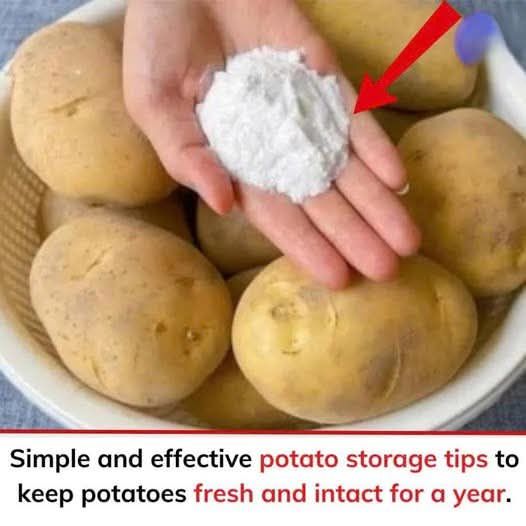ADVERTISEMENT
Simple and Effective Potato Storage Tips to Keep Potatoes Fresh and Intact for a Year
Potatoes are one of the most versatile and widely used ingredients in cooking. From mashed potatoes to fries, baked potatoes, and stews, they are a staple in many kitchens. However, keeping potatoes fresh and intact for as long as possible can be a challenge. Improper storage can lead to sprouting, rotting, or spoiling, causing you to throw them out before you’ve even had the chance to use them.
To help you maximize the shelf life of your potatoes, here are some simple and effective storage tips that will keep your potatoes fresh, firm, and intact for up to a year!
1. Choose the Right Potatoes
- Why it works: Not all potatoes are created equal. Some varieties have a longer shelf life, while others tend to spoil faster. It’s important to select the right type of potatoes for long-term storage.
- Best Varieties for Long Storage: Russet potatoes are the best choice for long-term storage due to their thick skins and low moisture content. Other varieties like Yukon Golds or red potatoes can also be stored, but may have a shorter shelf life.
- Tip: When buying potatoes, select those that are firm and free of blemishes, spots, or cuts. Damaged potatoes won’t store well and may spoil faster.
2. Store in a Cool, Dark Place
- Why it works: Potatoes should be stored in a cool, dark environment to prevent them from sprouting and turning green. Light and heat speed up the spoilage process.
- Ideal Temperature: Aim to store potatoes in a place with a temperature between 45°F to 50°F (7°C to 10°C). Any warmer, and the potatoes will begin to sprout, while freezing temperatures will cause them to become mushy.
- Best Locations: A cool basement, cellar, or pantry is the perfect spot. Avoid storing potatoes in the fridge, as cold temperatures cause the starches to turn into sugars, resulting in a sweet, unpleasant flavor.
3. Use Proper Ventilation
- Why it works: Potatoes need airflow to prevent moisture buildup, which can lead to rot and mold. Without proper ventilation, they may quickly spoil.
- Storage Solutions: Store potatoes in perforated bags, burlap sacks, or cardboard boxes with ventilation holes. This allows air to circulate around the potatoes, keeping them dry and preventing mold or mildew growth.
- Tip: Never store potatoes in plastic bags without holes, as these trap moisture and accelerate the rotting process.
4. Keep Potatoes Away from Onions
- Why it works: While both potatoes and onions are commonly stored in similar conditions, they should never be stored together. Onions release gases that can cause potatoes to spoil more quickly.
- Tip: Store potatoes and onions in separate areas to prevent them from affecting each other’s shelf life. If you need to store them in the same space, make sure they are in separate containers with good airflow.
5. Check Regularly and Remove Any Spoiled Potatoes
- Why it works: Even under the best storag
